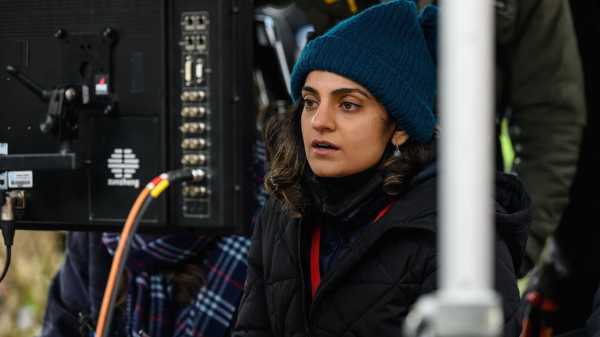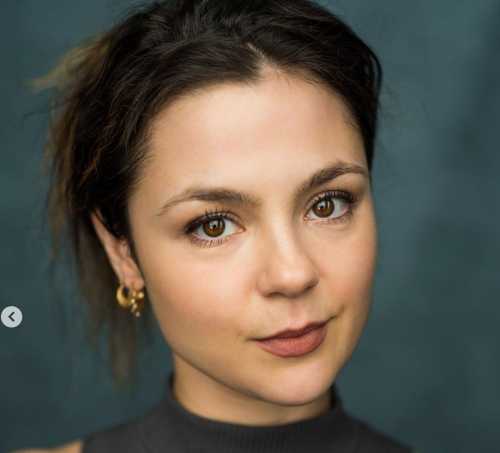
Three minutes into the first episode of “We Are Lady Parts,” a British sitcom about an all-female, all-Muslim punk band that débuted in the spring of 2021, the band is introduced rehearsing a raucous anthem. “I’m gonna kill my sister,” Saira, the tattooed, plaid-shirt-wearing lead singer and rhythm guitarist, snarls. “She stole my eyeliner . . . and she’s been stretching out my shoes with her big fucking feet.” Alongside Saira are the other members: Bisma, the bass player, who wears a headwrap and a cowrie-shell necklace, and Ayesha, who pounds the drums furiously, tossing luxuriant hair that’s typically kept tucked under a headscarf. On the couch is Momtaz, the band’s manager, rocking out in a midnight-blue niqab. The song, “Ain’t No One Gonna Honour Kill My Sister But Me,” is, like the best punk anthems, delivered straight and filled with rage. Meanwhile, the show that it’s a part of—created by Nida Manzoor, a thirty-three-year-old writer and director from London—is, like the best comedy, sly and subversive. Securing a rare hundred-per-cent positive rating on Rotten Tomatoes, “We Are Lady Parts” is as unexpected and as heady as the cloud of vape smoke that wafts through Momtaz’s veil.
When “Lady Parts” débuted in Britain, on Channel 4, it was immediately hailed as something new: a series that represented the experience of young British Muslim women by acknowledging the should-be-obvious fact that there is no single experience shared by young British Muslim women. Instead, there is a multiplicity of experiences, which, in “Lady Parts,” is refracted through its ensemble cast. There’s the experience of Saira, who, when she is not making music, is butchering halal meat and, in dealing with her own trauma and loss, trying to keep her devoted boyfriend at a distance. There’s that of Bisma, who has a young daughter, a partner, and an aspiring career as a creator of feminist graphic novels called “The Killing Period (Apocalypse Vag)”—“think ‘Handmaid's Tale’ meets ‘Rugrats,’ ” she says. There’s that of Ayesha, who, as an Uber driver, has to deal with the prejudices of riders like the three young men who ask her if her dad is forcing her to work. “Yeah, he said if I don’t drive simple dickless pissheads around he’s going to send me to Iraq to marry my cousin,” she replies, before blasting them with heavy metal. The swaggering Momtaz, who wheels and deals on behalf of the band in her veil, gown, and gloves, and who also works in a fancy-lingerie shop selling bras that she categorizes to one customer as “recreational, titillational, factual, respectful, shag-me-kind or shag-me-hard,” repudiates the bigoted perceptions of observant women held by some non-Muslim Brits, including the former Prime Minister Boris Johnson, who once characterized women who choose to wear the burqa as “looking like letterboxes.”
Then there is the newcomer to the band, Amina—a Ph.D. microbiology student who dresses in demure cardigans and long skirts and pastel-hued hijabs, and is on the lookout for a husband, but who is also persuaded to join the band and let loose her hitherto repressed artistic self. Amina, the series’ central character, is played with winning goofiness by Anjana Vasan, who recently won an Olivier Award for her portrayal of Stella in “A Streetcar Named Desire” on the West End stage. Amina’s perspective is often presented in voice-over, with her—frankly hot—fantasies about potential romantic partners depicted in the style of different movie genres. Thus, a stern-looking, black-clad suitor flanked by his conservative parents is transformed in her imagination into a shirtless Mesopotamian warlord from an action movie, while her awkward encounters with the cool, charming Ahsan, the brother of Ayesha, are transposed into black-and-white Hollywood mid-century glamour. “We Are Lady Parts” presents a counternarrative to the ways in which young British Muslim women are typically presented on television: either as patriarchy’s victims, or as potential extremists. The show’s characters are joyful, liberated, confused, glamorous, assertive, and buoyed by a powerful sisterhood. “We simply seek to speak our truth before we are mangled by other people’s bullshit ideas of us,” Saira says, of the band’s ethos, which also appears to be Nida Manzoor’s ruling ethos in creating the show in the first place.
Manzoor was born in London and spent much of her youth in the city; she attended University College London, where she studied politics, and was heading toward a career in the law before turning to writing and directing while a student. As a child, she was introduced to British comedy shows from the seventies and eighties such as “Fawlty Towers” and “Blackadder,” while a touchstone of her own generation was “Peep Show,” the long-running sitcom that débuted in 2003 and was co-created by Jesse Armstrong, latterly the writer and showrunner of “Succession.” Also emerging during Manzoor’s childhood was comedy created by British-Asian actors and writers, such as the award-winning sketch-comedy show “Goodness Gracious Me.” A classic segment showed a rowdy group of friends around a restaurant table on a Friday night “going for an English”: repeatedly mispronouncing the waiter James’s name, asking for “the blandest thing on the menu,” and ordering twenty-four plates of chips.
The preoccupations of British comedy, which is so often characterized by small-canvas satirical explorations of humiliation and repression, make themselves clearly felt in Manzoor’s work. But there are other notable influences, especially Bollywood spectaculars, martial-arts flicks, American action movies, and teen buddy comedies, all of which Manzoor consumed while spending her elementary-school years living in Singapore, where her father worked in finance. The imprint of both Basil Fawlty and Bruce Lee are discernable in Manzoor’s début feature film, “Polite Society,” which stars “Bridgerton” ’s Priya Kansara as Ria Khan, a teen-age schoolgirl and martial-arts student, whose aspiration to be a professional stunt woman is frowned upon by the teachers at her all-girls private school. Ria meets with equal disapproval in her affluent British-Pakistani community in West London, where appropriate careers exist on a spectrum between doctor and lawyer, and suitable marriages are arranged by elegant, social-climbing mothers. Manzoor’s own mother’s profession, that of a gynecologist, makes a twisted appearance.
The movie’s somewhat misleading title, as well as early sequences in which Ria jousts with her older sister, Lena—an art-school dropout who precipitously becomes engaged to an accomplished, handsome doctor—suggests that Manzoor intends to anatomize the manners of her characters by means of romantic-comedy-meets-Romantic-era-fiction tropes. Manzoor even throws in a reference to Jane Austen. “I did go to a school where I read a Jane Austen novel every year,” she said during a Zoom interview earlier this month. (She also wore a frumpy school uniform like those worn by Ria and her sidekick classmates.) But the film’s kinship with the novels of Austen is not so much in its exploration of the marriage plot—somewhat exhaustively worked over in cinematic adaptations by now—but in the ways in which Manzoor is concerned with the charged relationships between female siblings, perhaps Austen’s ruling preoccupation. “Polite Society” at first suggests that Ria’s disapproval of Lena’s romance might be nothing more than jealousy of her sister’s refocussed attention and sorrow over the way in which, inevitably, growing out of childhood and into adult relationships means the diminishing of the sisters’ close bond.
But the film subverts those domestic-drama expectations with a horror-movie plot twist, incorporating “Crouching Tiger”-esque fight scenes, heist-movie action sequences, and an extravagant Bollywood-inspired dance number. As in “Lady Parts,” Manzoor plays cleverly with the language of cinema: the high-tea gathering at which the mothers plot the potential nuptials of their offspring is shot on a circular track in the mode of a gangster-movie confab—“like in ‘The Sopranos,’ or ‘Reservoir Dogs,’ ” Manzoor explained. Ultimately, “Polite Society” offers a blend of tropes that borders on the hysterical—sampling a range of genres, and playing with their attendant clichés, in order to relate the experience of women, and especially of teen-age girls, a cohort that is usually not represented through those genres. Another clear influence is Jordan Peele’s “Get Out,” which used the genre of horror to explore the true horror of American racism. Unlike “Get Out,” though, Manzoor’s film focusses upon the perfidies and preoccupations that exist within the community she is representing—the mother-son dynamic is damningly satirized—rather than upon exploring the ways in which that community is perceived from outside. If Peele’s movie unveiled the terrors of being a Black man in a white world, “Polite Society” opens up a hitherto largely unrepresented world for a wider view.
Manzoor, whose writing and directing credits before “Lady Parts” were limited to individual episodes on established TV shows—including a couple of episodes of “Doctor Who”—wrote, in advance of her own series’ release, about the burden of expectation that she felt as a young, female, Asian, Muslim writer and creator. “My executive producer didn’t mean to freak me out when they mentioned the ‘responsibility on my shoulders’ in representing these marginalised voices,” Manzoor recalls. “I am spiralling. Representation. Responsibility. The words hang dense in the air like farts trapped in a spacesuit.” Earlier in her career, she was sometimes offered gigs as co-writer to a white male writer, the idea being that she would function as a kind of authenticity consultant. She turned down roles of that sort, she explains. “I already disappointed my parents enough by deciding to be a filmmaker—I’m not now going to disappoint myself as well,” she said. “It wouldn’t be worth it if I just went and wrote some honor-killing thing with some bro.”
The obligation to speak for and depict an ethnic or culturally defined group may be an inherently comedy-sapping proposition. “You can’t write jokes when you feel responsible,” Mazoor says. When the weight was too much to inspire the necessary lightness, she would go and watch “This Is Spinal Tap,” which she describes as “art made by people who felt totally unburdened.” If the blend of genres and the twists of plot do not always entirely hold together in “Polite Society,” it is not for want of ambition. It is a very Manzoor touch to turn a bikini-wax session into a literal torture scene, with aestheticians choreographed as if they were teen-horror zombies, and a monstrous female presence attempting to undermine the insight and potency of young Ria Khan. A few years ago, Manzoor smilingly told a red-carpet interviewer that she wanted to have her female characters “kick the shit out of each other, because that’s fun, and I like to see people kicking the shit out of each other”—herself cheerfully subverting the expectations held of any young female film director, whatever community she might come from. ♦
Sourse: newyorker.com






